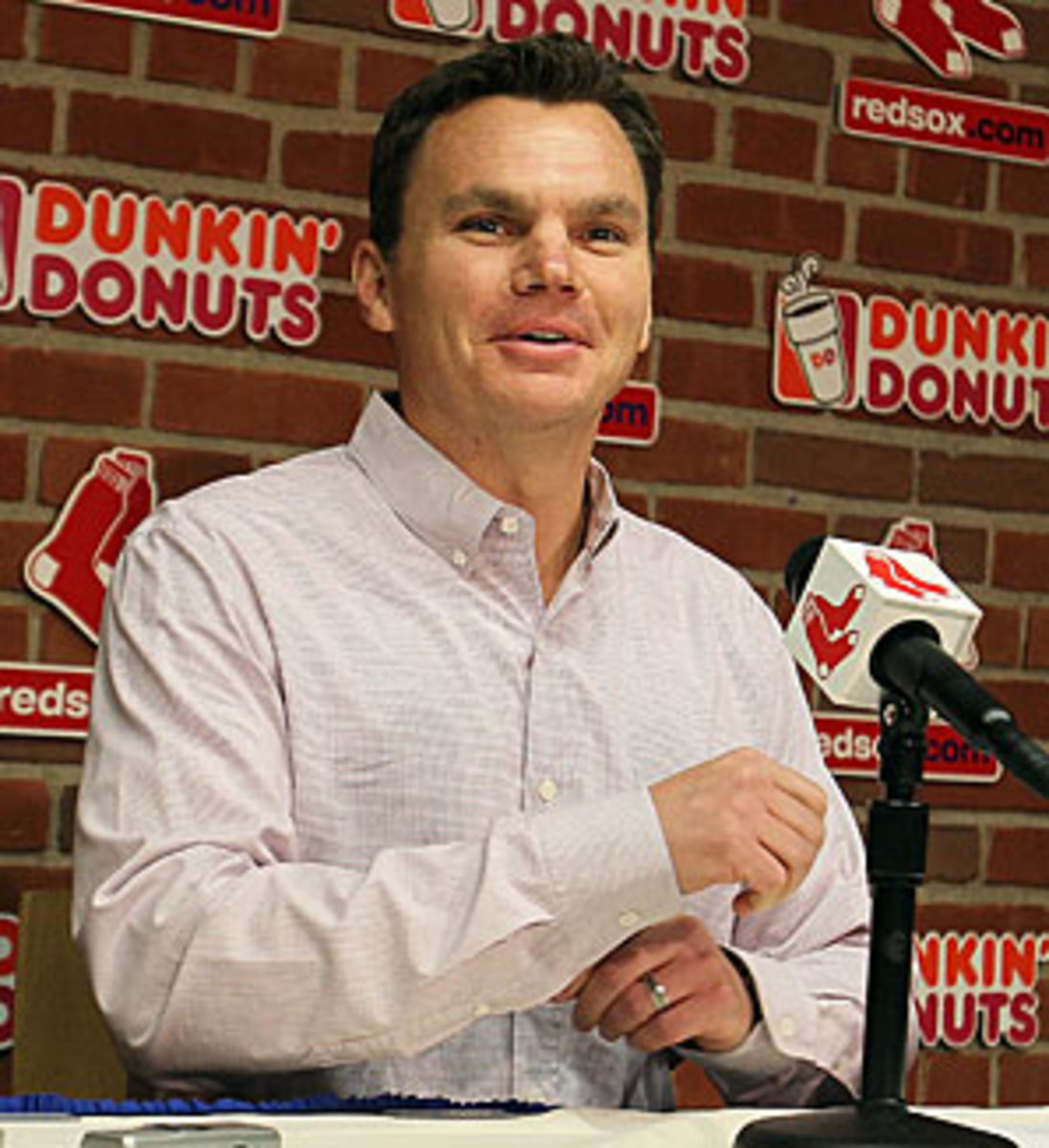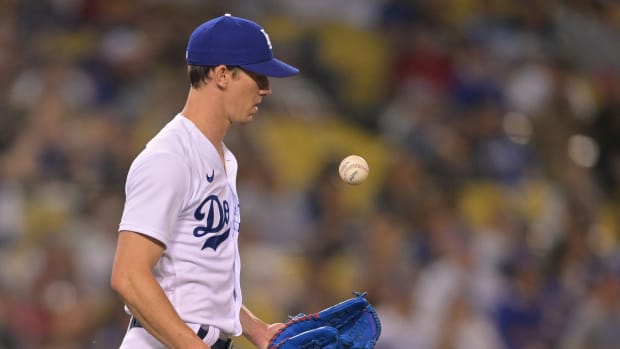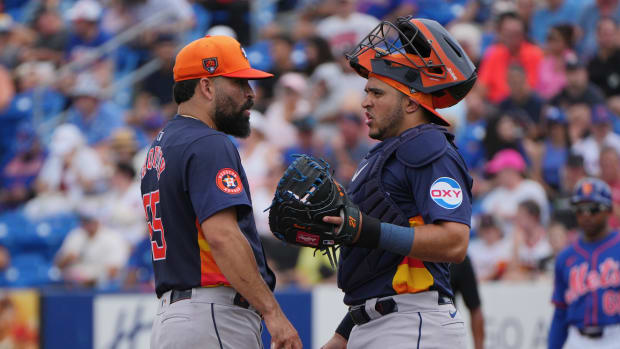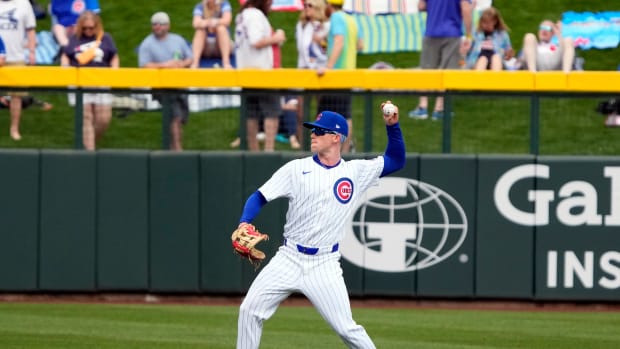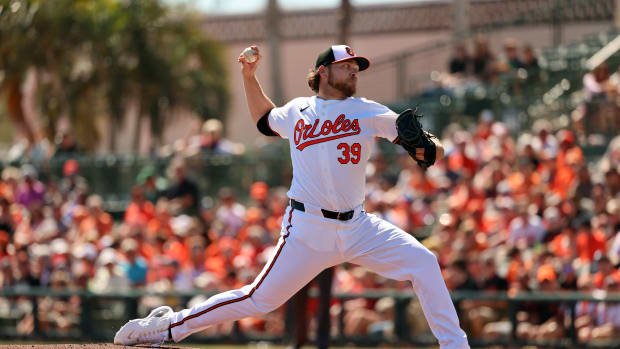More changes coming for Red Sox
Red Sox GM Ben Cherington will have several tough questions to answer in the offseason about his team's roster and leadership. (Jim Rogash/Getty Images)
Where are the Red Sox headed? That's a natural question to ask in the wake of Saturday's shocking nine-player blockbuster trade with the Dodgers. Entrenched under .500, headed for their third straight season without a playoff berth, and awash in acrimony, the team appeared to be in dire need of a makeover, but with so many big contracts on the books, such an opportunity appeared to be unlikely in the near term. Thanks to the surprising largesse of the Dodgers, who took on approximately $262.5 million of the $275 million in remaining salaries of the four players they received, the Sox now have that opportunity.
What follows are a few thoughts about the shape of the franchise in the wake of the trade.
• This is the end of the Theo Epstein era.
Epstein spent roughly nine years as the Red Sox general manager, and it was on his watch that the franchise not only ended its 86-year world championship drought in 2004 but also brought home a second title in 2007, and essentially achieved parity with the Yankees. But in the wake of diminishing returns —an ALCS loss in 2008, a first round exit in 2009 and playoff-free seasons since then — Epstein made larger and larger deals in order to keep pace with Boston's AL East rivals. Not all of those deals fit in with the philosophy that the organization had developed in building such a powerhouse. "Some of the offseasons that we had were more offseasons of convenience — giving in to the need to be good next year,” he said in an interview earlier this summer. "If I have a regret about the way we handled that offseason [after the 2009 season], it was that instead of being more patient and saying ‘'We’ll strike when the time is right,' there was a lot of pressure in the environment at the time to do something."
That winter's big free agent prize was John Lackey, whose five-year $82.5 million deal has been a dud; the former Angels righty put up a gaudy 4.40 ERA in 2010, then an even more inflated 6.41 mark last year before it was revealed he needed Tommy John surgery; he'll miss this entire season. In the spring of 2010, the Sox signed Josh Beckett to a four-year, $68 million extension that would kick in the following year; Beckett stumbled to a 5.78 ERA as part of his increasingly apparent pattern of even-year slumps. After missing the 2010 playoffs, the Sox traded top prospects Casey Kelly and Anthony Rizzo as part of a four-player package to the Padres to acquire Adrian Gonzalez, and they eventually agreed on a seven-year, $154 million extension that kicked in this year. They also signed Carl Crawford to a seven-year, $142 million deal that didn't pan out as expected, a move that owner John Henry said he personally opposed. Mind you, the Sox spent most of last season looking like a team for the ages, and preliminarily validating the work of Epstein and company, but their 7-20 September record led to tabloid-style revelations about player conduct and the ouster of manager Terry Francona. Before the end of October, Epstein sought his exit as well, taking a job as president of the Cubs.
The Boston brass promoted Epstein assistant Ben Cherington to be the new GM, but aside from the hiring of Bobby Valentine, the Sox had an underwhelming offseason in which they failed to bolster their rotation beyond deciding to convert Daniel Bard from his setup role, and settled for Mike Aviles at shortstop after both trading Jed Lowrie and Marco Scutaro. Long-term roster flexibility was clearly a problem, as Cherington was forced to maneuver around the legacy that Epstein had left, one that the organization no longer fully supported. By clearing Crawford, Gonzalez and Beckett, Cherington has swept that legacy out the door and given the team plenty of room to rebuild.
• The Red Sox are no longer the game's second-biggest spenders.
According to Cot's Baseball Contracts, the Sox opened the season with the game's second-highest payroll, behind the Yankees, of $175.2 million, their third straight year among the top three, and above the luxury tax threshold. With the aforementioned players on the books, and even with the likes of David Ortiz, Kevin Youkilis and Daisuke Matsuzaka headed for free agency at the end of the year, the team had $106.85 million committed to just nine players for 2013, and $94.1 million committed to six players for 2014. With the new Collective Bargaining Agreement setting steep penalties for repeat offenders starting in 2014, Cherington and company faced significant pressure to keep the payroll below that year's luxury tax threshold of $189 million while fielding a team that would inevitably be expected to go toe-to-toe with the Yankees.
Youkilis was traded back in June and last week's deal with the Dodgers removed the team's three highest-salaried players from the payroll, and reduced their 2013 and 2014 obligations to $45.6 million and $34 million, respectively, numbers that rank in the lower half of the majors. Getting under the luxury tax threshold will be no real challenge, saving the team even more money by avoiding the penalties. Of course, the new CBA's restrictions on draft and international spending increase the likelihood that those saved dollars will be thrown at other veterans.
• This winter's free agent market isn't a great fit for the Red Sox.
With Melky Cabrera having immolated any chance of a long-term contract, the upcoming free agent market continues to dwindle, and marquee names such as Zack Greinke and Josh Hamilton don't seem like obvious fits given the scrutiny they would face in Boston's fishbowl-like environment. With Cole Hamels re-signing with the Phillies, the market offers little in the way of frontline pitching beyond Greinke; R.A. Dickey, Dan Haren and Tim Hudson are likely to have their options picked up by their current teams, and Francisco Liriano is too volatile to merit a long-term commitment. Beyond Hamilton, the market could be awash in centerfielders — Michael Bourn, Shane Victorino, and B.J. Upton among them— but Jacoby Ellsbury is under club control though 2013. Nick Swisher, who may be squeezed out of the Yankees' future by their own concern regarding the 2014 luxury tax, is said to be seeking a contract along the lines of Jayson Werth's seven-year, $126 million deal. While the switch-hitting rightfielder could certainly light up Fenway Park, it's tough to see the Red Sox going back to the ways they've just abandoned by giving an over-30 outfielder that much money.
• The Sox can keep David Ortiz and Ellsbury if they so desire.
An icon thanks to his key role on the two world champions, Ortiz has become increasinglyvocal about his lack of job security while other Red Sox received long-term deals. As I noted back in June, rather than extend him following the expiration of his four-year, $52 million deal that ran from 2007-2010, they picked up his 2011 option at $12.5 million, which represented a slight pay cut. Even as Ortiz came off a strong 2011 season — his best since 2007 — he settled for a one-year, $14.575 million deal. Hitting .316/.414/.609 with 23 homers as of July 16, he appeared headed for an even better season, but a strained Achilles tendon has limited him to just one game since then; after playing on Friday, he is headed back to the DL.
It's certainly not necessary for the Sox to re-sign Ortiz, who will turn 37 in November, but even in going year-to-year with him, the team has already shown a willingness to pay a premium above what other teams are paying for DHs. While the iconic slugger had declared his fatigue regarding the atmosphere surrounding the club, CEO/president, Larry Lucchino has publicly expressed a desire to retain him for the remainder of his career. Particularly as his production remains strong, keeping the iconic slugger may be a shrewd public relations move for a team that will have some unfamiliar faces in the next couple of years.
As for Ellsbury, the 28-year-old centerfielder been limited to just 48 games this year due to a shoulder subluxation, the second season out of three in which he's missed the bulk of the season due to injuries. Sandwiched between those two years was an MVP-caliber 2011 campaign in which he hit .321/.376/.552 with a career-high 32 homers as well as 39 steals; when he's healthy, he's an elite player. Ellsbury won't reach free agency until after the 2013 season, and while he previously seemed bound for an exit based upon the crowded payroll, the Sox now have plenty of room to keep him. As with Ortiz, doing so may require some fence-mending, particularly as Ellsbury was critical of the team's medical staff when his fractured rib was misdiagnosed in 2010.
Two things complicate the possibility that Ellsbury re-signs with Boston: First, he is a Scott Boras client, and the überagent is notorious for encouraging his players to test free agency and thus net top dollar instead of granting adiscount to their current team. Second, Boston's top prospect, 2011 supplemental first-round pick Jackie Bradley, is a 22-year-old centerfielder who has hit .319/.427/.486 in a season split between High-A and Double-A. He could be ready for a major league job by 2014, and perhaps sooner. Boston doesn't have to make a decision about Ellsbury yet, but it does have the option of dealing him this winter or prior to next year's deadline for more young players if their overtures toward keeping him are met with a lack of enthusiasm. One idea: A swap with Arizona for Justin Upton, whom the Diamondbacks shopped prior to the deadline; Boston could easily take on the $38 million the 25-year-old rightfielder is owed from 2013-2015, while the Diamondbacks save face by getting an All-Star caliber player in return, one whom they can consider retaining themselves.
• Boston will rebuild around a deep farm system.
Coming into the year, the Red Sox had a farm system that ranked 10th according to Baseball America, and 12th according to Baseball Prospectus, with the two publications sharing the consensus that the system's considerable depth was offset by a lack of upper-level pitching. The acquisitions of Rubby De La Rosa and Allen Webster address that, and both could have an impact as soon as next season. With now-injured third baseman Will Middlebrooks and catcher Ryan Lavarnway already assuming greater roles as this season has gone on, the team can look to the next wave, which includes not only Bradley but also shortstop Xander Bogaerts and leftfielder Brandon Jacobs. Boegarts, who hasn't turned 20 yet, was just promoted to Double-A; his future likely lies at third base — creating a potential logjam down the road given Middlebrooks' emergence — but BP's Jason Parks describes him as a potential 30+ homer threat given his bat speed and torque. There's much more beyond those players, some of whom may be used in deals to obtain other players the Red Sox desire.
• Bobby Valentine is likely on his way out.
Given that Gonzalez was among those players who aired grievances to management over Valentine, and that Beckett created several headaches as well, the trade would appear to have bolstered the embattled skipper's hold on the team. But even with a contract for 2013, it's hardly clear that Valentine is returning. As Tom Verducci pointed out, retaining Valentine could create the impression that management chose sides against the players. His continued presence would also be a sour reminder of a season gone awry. The roster remake gives Cherington and company an excuse to turn to a more low-key manager suitable to growing with a new nucleus, and with a lower payroll, eating the cost of Valentine's remaining year isn't likely to have an impact on Boston's spending.






























